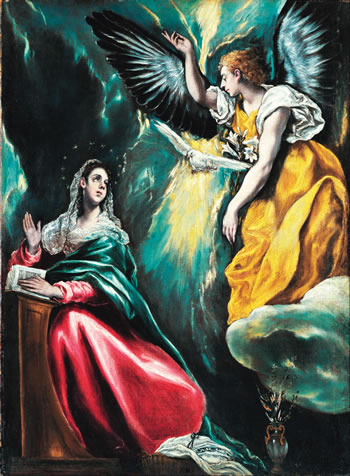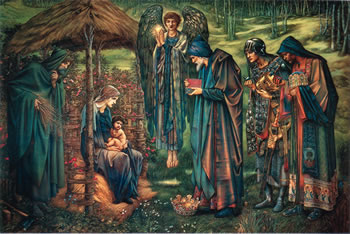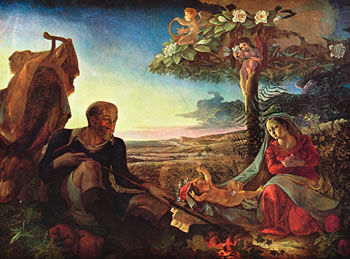Fulfillment Quotations in Matthew’s Gospel

by Joseph McHugh
Some forty years ago, Scripture scholar Peter Ellis wrote of the first gospel, ‘Reading Matthew, one gets the feeling the author put together his gospel with the precision of a Swiss watch.’ One sign of this precision is that Matthew includes in his Gospel ‘fulfillment quotations,’ Old Testament statements in something other than their historical sense. These function as evidence of Jesus’ messianic identity. For Matthew, Jesus embodies Israel’s story.
Matthew 1:22-23

The Annunciation
El Greco, c. 1595
‘All this took place to fulfill what had been spoken by the Lord through the prophet: / ‘Look, the virgin shall conceive and bear a son, ...’
Young King Ahaz of Judah has a problem. Two bigger and more powerful countries, Syria and Israel, have invaded to depose the uncooperative Ahaz and replace him with a king who would join them in revolt against the mighty Assyrian Empire. Judah was being badly defeated. The prophet Isaiah delivered Yahweh’s message to Ahaz. The king trusted not in the Lord but in superpower Assyria instead. The Assyrians defended Judah and conquered Israel and Syria.
But Assyria’s price was high -- tribute from the treasures of God’s Temple and from the royal treasury. Worse, Ahaz built idols of the pagan Assyrian gods in Judah to win favour with his new ally.
Matthew’s original audience would have recognized that this fulfillment quote was from Isaiah 7:14. When Matthew uses this verse it does not mean that Isaiah was prophesying the virginal conception of Jesus. What practical use would a sign more than seven centuries in the future be to King Ahaz as his enemies descended on him? Rather, Matthew sees in the event of Jesus’ conception a ‘super-fulfillment’ of the words of Isaiah, of which the prophet himself was unaware.
Matthew 2:5-6
‘In Bethlehem of Judea; for so it has been written by the prophet: / “And you, Bethlehem, in the land of Judah, are by no means least among the rulers of Judah; for from you shall come a ruler who is to shepherd my people Israel.” ’

Star of Bethlehem, Edward Burne-Jones, 1890
Ancient Bethlehem was small. It was not even in the long list that contained Judah’s 115 towns (Joshua 15:20-63). The town was unimportant, but the most important person in history would come from it.
Matthew quotes Micah 5:1 rather freely, calling Bethlehem not ‘too small’ but ‘by no means least,’ and adds the phrase ‘who is to shepherd my people Israel’ from 2 Samuel 5:2, the address to David at the start of his reign. Many Jews identified the ruler mentioned by Micah as the Messiah.
Matthew thinks of the Magi as righteous Gentiles. Paul (Romans 1:18-20) describes these Gentiles as having the capacity to draw close to God through good deeds and reflection on nature. Yet Matthew, true to his Jewish heritage, believed that good deeds and reflection on nature could only go so far. The Magi had to come to Jerusalem and the scribes entrusted with the Sacred Scriptures to find that the Messiah would be born in Bethlehem. Revelation combined natural wisdom and biblical prophecy.
Matthew 2:15
‘This was to fulfill what had been spoken by the Lord through the prophet, “Out of Egypt I have called my son.” ’
The eighth-century B.C. prophet Hosea (11:1) reflected on God’s great saving act, the Exodus. When Hosea speaks of Egypt, he is looking into the past when God’s son, Israel, was brought out of Egypt during the Exodus. Matthew is arguing that Jesus fulfills in a greater way Israel’s experiences with God.
We usually associate Egypt with the enslavement of the Israelites. Ironically, Egypt later became a source of refuge (See 1 Kings 11:40 and 2 Kings 25:26). Egypt becomes the safe haven for the Holy Family until Herod and those who sought the Child’s death have died. Then the Father called his Son Jesus ‘out of Egypt.’
Matthew 2:17-18

Rest on the Flight into Egypt, Philipp Otto Runge, 1806
‘Then was fulfilled what had been spoken through the prophet Jeremiah: / “A voice was heard in Ramah, wailing and loud lamentation, Rachel weeping for her children; she refused to be consoled, because they are no more.” ’
Ramah was a small town six miles north of Jerusalem. Ramah was the point at which Nebuchadnezzar assembled the people of Judah for their long trek into captivity in Babylon. The matriarch Rachel, whose tomb is near Bethlehem, is lamenting her distant offspring. The occasion of Rachel’s weeping was the terrible suffering of her descendants. The desolation was so heart-wrenching that it seemed that her children ‘are no more,’ i.e., they were dead. She simply refused to be comforted.
Matthew applies the weeping of Rachel to the slaughter of the innocents. Although there is no independent confirmation of Herod’s having killed all the boys of Bethlehem two years old and younger, it is consistent with his known actions, including executing several of his own family whom he thought were threatening his throne. All the more reason Herod would want to kill the new King of the Jews, the very title the Romans had given Herod.
Matthew 2:23
‘... he made his home in a town called Nazareth, so that what had been spoken through the prophets might be fulfilled, “He will be called a Nazorean.” ’
There is no such quotation in the Old Testament. Matthew seems to be indulging in some word play with the name of Jesus’ childhood home town. Isaiah (11:1) prophesied ‘A shoot shall come out from the stump of Jesse, and a branch shall grow out of his roots.’ The Hebrew for ‘branch’ is netzer, which sounds like Nazarene. So also does Judges 13:5, ‘No razor is to come on his head, for the boy shall be a nazirite to God from birth.’ Nazirite (one who is consecrated to God) also sounds like Nazareth.
Matthew’s believers in the Crucified-and-Risen Lord read their scriptures with new eyes.
 Entries(RSS)
Entries(RSS)